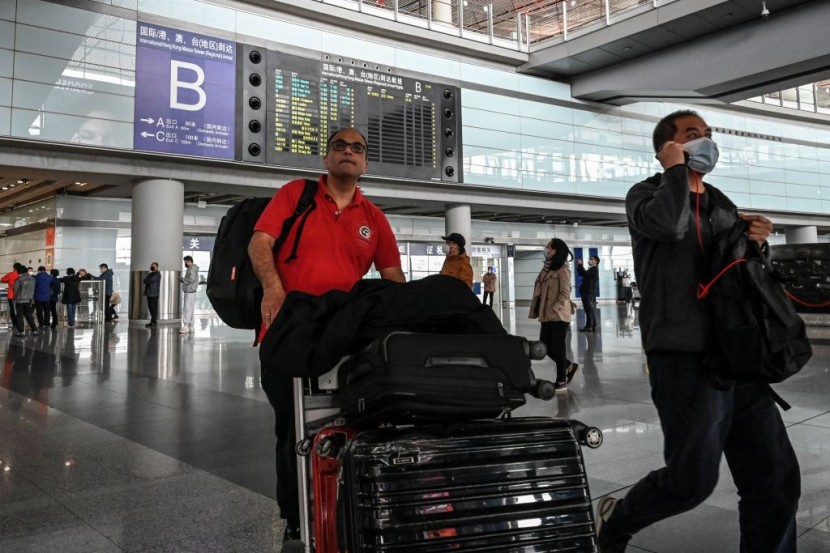
(Photo: by JADE GAO/AFP via Getty Images) Passengers walk through the arrivals hall for international flights at the Capital International Airport in Beijing on March 14, 2023. - China will once again start issuing a range of visas to foreigners on March 15, in a major easing of travel restrictions in place since the outbreak of the COVID-19 pandemic.
According to official notices and more than a dozen people with knowledge of the situation, Chinese civil servants and employees of state-affiliated enterprises are subject to stricter restrictions on personal travel abroad and increased scrutiny of their foreign connections as Beijing fights foreign influence.
Ten current and former workers told Reuters that since 2021, restrictions have been broadened to include prohibitions on international travel, stricter restrictions on the frequency and length of travels, onerous approval procedures, and pre-departure confidentiality training.
Exaggerated Travel Restrictions?
They claimed that the actions had nothing to do with COVID-19 and had been "exaggerated," and she added that teachers should think about whether enough students are actually knowledgeable about using AI.
Although the testimonies of the individuals varied, they all described increased scrutiny of international travel even after China reopened its borders in January.
Due to the sensitivity of the subject, the individuals, who worked as civil servants throughout the nation in state-owned businesses or the public sector more broadly, talked on the condition of anonymity.
Tightening Employee Travels Outside of China
In addition, eight public statements made over the previous two years by eight government organizations, including the national pension fund, suggested they were tightening restrictions on employees' personal trips outside of China but did not go into detail about the changes.
Other individual statements and documents reveal a parallel initiative by central and local Chinese authorities to map the personal and family connections of workers connected to the government and state.
More Focus on National Security
According to two analysts, the moves reflect President Xi Jinping's attention to national security in the midst of tense relations with the West. China recently promoted anti-spying initiatives among its populace and passed new legislation that widened the scope of spying.
Political philosophy also played a role with Xi preferring to "look inward for ideas" as opposed to looking to the West for inspiration.
Senior government officials and state executives with access to sensitive information have long been subject to restrictions on personal international travel.
According to the most recent data from 2015, there were 7 million public officials in China, and there were 70 million people employed by state-owned enterprises. Reuters discovered that these restrictions are now affecting these numbers.
According to two bankers, one with almost two decades of experience, lower-level employees at China Construction Bank in Beijing and Shanghai are only permitted to travel abroad for personal reasons once a year and for a maximum of 12 days.
When they both applied for time off in early 2023, they both learned about the restrictions, which they both claimed were unprecedented.
According to a teacher in Zhejiang province's southeast and a person with knowledge of new rules implemented in a Shanghai area this year, some public school instructors now face additional restrictions on their ability to go abroad.
An employee of a state-affiliated mutual fund said that recent travel restrictions had been extended to new workers in Hong Kong and Singapore. A big office of the state policy lender China Development Bank has reportedly barred abroad travel this year.
One of the 10 persons who discussed travel restrictions, and three other state-enterprise employees with knowledge of the situation, Chinese authorities are also checking personal international connections.
These individuals claimed they started receiving questionnaires in the latter part of last year from organizations including the Communist Youth League, Chinese People's Political Consultative Committee (CPPCC), local governments, and their various businesses.
According to the respondents, the applications requested information on relatives who had a foreign nationality or permanent residency abroad, as well as specifics about any foreign help or experience. They added that this was the first time they had ever seen the demands.
As China increases its public messaging about foreign influence, actions are being taken. On its recently formed WeChat account, the Ministry of State Security said in August that it had located a Chinese national in Italy who was allegedly spying for the United States. Chinese recruiters may be found abroad, the Central Intelligence Agency has warned.
Related article: Biden Admin to Prevent China From Accessing American AI Chips by Closing Major Loophole








